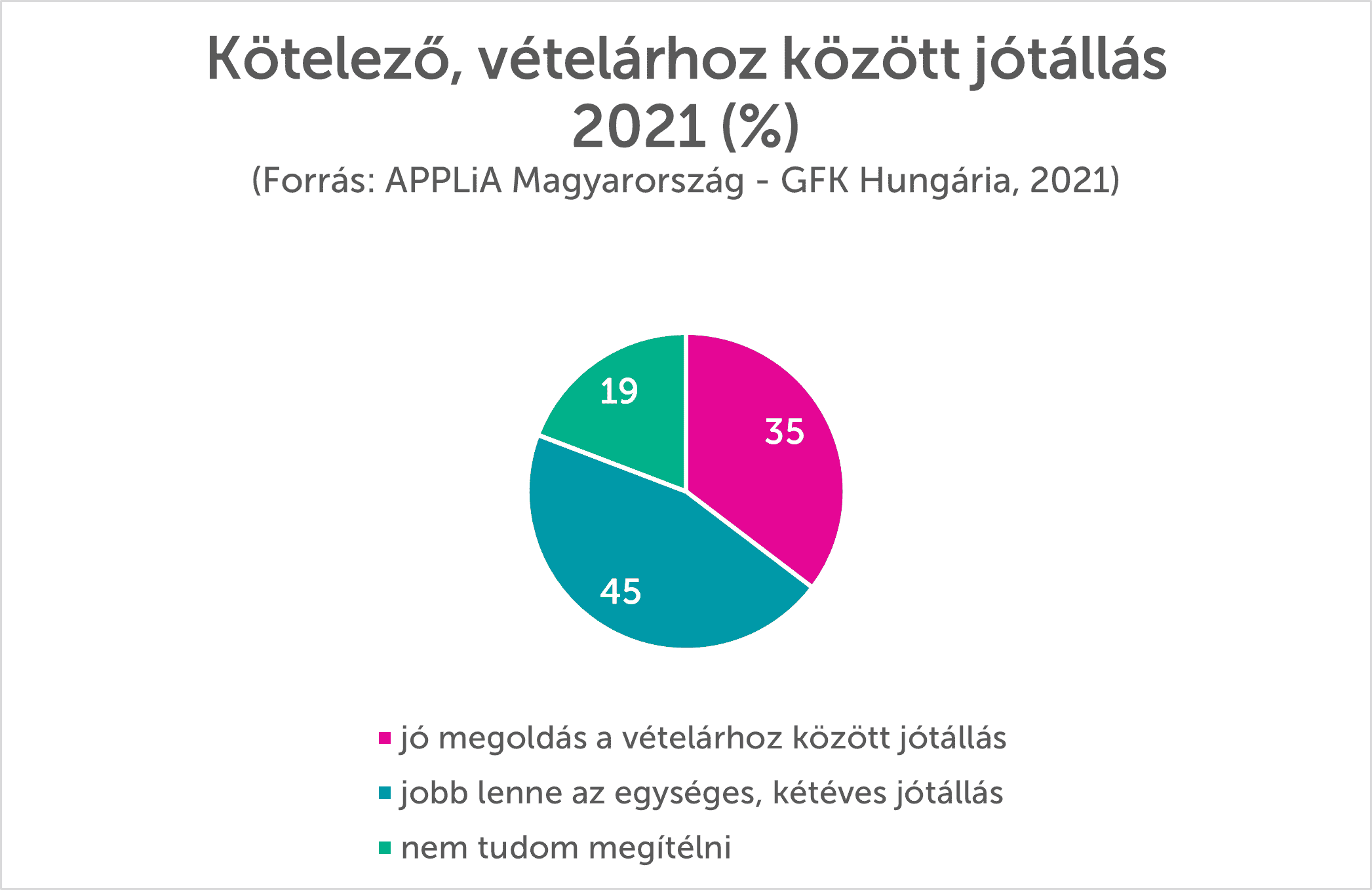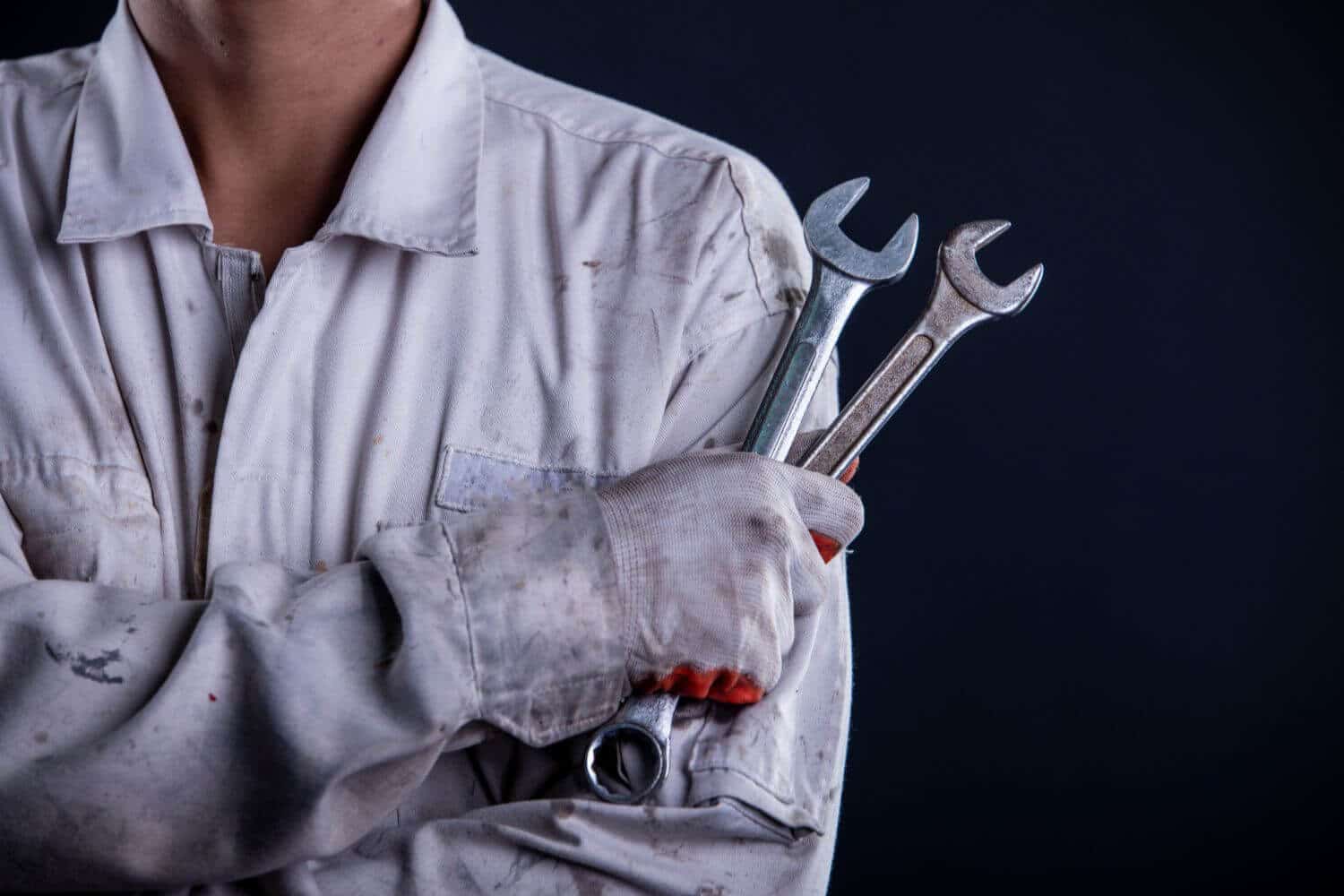The two most important things I need to know are the following:
- The most important change is that the duration of the warranty will be a function of the purchase price of the product: 1 year legal warranty for a purchase price of HUF 10.000 – 100.000, 2 years for a purchase price of HUF 100.001 – 250.000 and 3 years for a purchase price above HUF 250.000, according to the Government Decree 151/2003 (IX.22.) on the legal warranty for certain durable consumer goods.
- However, in the future, manufacturers may still choose to provide consumers with a longer warranty period for their products than the one required by law. (Note: As of 2022, the rules of the Government Decree 373/2019 (VI. 30.) will also apply to the commercial warranty!)
Where can I look up the rules?
Some consumer protection laws help us when it comes to legal warranties.
Here is the related legislation:
- Decree 151: Government Decree 151/2003 (IX.22.) on the legal warranty applicable to certain durable consumer goods
- Decree 19: Decree 19/2014 (IV.29.) of the Ministry for National Economy on the procedural rules for handling liability and warranty claims for goods sold under a contract between a consumer and a business
- Decree 45: Government Decree No. 45/2014 (II.26.) on the detailed rules of contracts between consumers and businesses
- PTK: Act V of 2013 on the Civil Code
- Consumer Protection Act: Act CLV of 1997 on Consumer Protection
- As of 2022, Decree 373 will also contain important rules (Government Decree 373/2019 (VI. 30.))
What is a warranty?
Warranty is a consumer right, referred to in colloquial usage as a “guarantee”.
We hear many, many expressions for enforcing consumer rights in the event of a defect in a product or service. These are for example “guarantee”, warranty, legal warranty, liability, commercial guarantee. However, it is not always simple to interpret and apply them in practice, i.e. when can we exercise one of our rights or another and what can we expect from the obliged party’s side. At times it is not even simple to determine who the obliged party is.
“Guarantee”
First of all, let’s take a look at the best-known, and perhaps most commonplace, term: guarantee. Guarantee as a legal term does not exist in Hungarian legislation, only in colloquial language. When we talk about a guarantee, we are dealing with the legal concept of warranty. So guarantee means warranty. Now let’s find out what warranty is.
Warranty
Warranty means that the party obliged to provide the warranty (i.e. the seller) is responsible for faultless performance in such a way that, in the event of a product defect or other quality complaint occurring during the warranty period, he/she can only be exempted if he/she proves (so the burden of proof is on the party obliged to provide the warranty, it is important!) that the defect occurred after performance (for example, because of improper use of the product by the consumer).
The legal warranty
There are two forms of warranty: the first, the legal warranty, is based on statutory provisions. In this case, the party obliged to provide a warranty (the trader/seller/business) is obliged to provide the consumer with a warranty in certain cases. The cases in which this is the case are defined in Decree 151 (see later for details).
The contractual warranty
Another form of warranty is when the seller assumes a warranty under a contract. In this case, the terms of the warranty are also defined in the contract itself (e.g. the warranty period and the obliged party). For these contracts, Decree 373 contains new rules from 2022.
Liability
Until 15 March 2014, we understood by liability the liability for latent defects, so let’s first take a look at what liability for latent defects means.
Liability for latent defects means that the seller is liable for the defect of the product (the defect that was present in the product at the time of performance, i.e. at the time of sale!).
The burden of proof depends on when the defect becomes apparent. Indeed, within the first 6 months – in the case of consumer contracts – it must be presumed that the defect existed at the date of delivery. Hence, if the product becomes defective within 6 months from the date of purchase, it is up to the seller to prove that the defect did not exist at the time of selling the product (but it is due, for example, to the improper use of the product by the consumer), but if we want to exercise our right of warranty beyond 6 months, it is up to us to prove that the defect existed even at the time of purchase. It is important to emphasize again that this right is not granted to those who buy on a company account!
If we invoke defective performance within the warranty period, and it turns out that the defect may have been caused by our failure to comply with our maintenance obligations (and we clearly do so if we do not carry out the maintenance tasks described in the instructions!), we will be liable for the costs of the defects resulting from the failure to carry out the maintenance tasks even within the warranty period.
The Civil Code introduced a new concept, namely the product warranty.
The product warranty is the manufacturer’s direct liability in the form of a warranty vis-à-vis the consumer for a defect in the product.
It is important to underline, however, that this right, just like the legal warranty and the more favorable liability for latent defects, is only granted to consumers and only and exclusively for the purchase of movable goods. The manufacturer or importer of the product and the distributor (trader/seller/company) may also be qualified as a manufacturer.
With this new institution, the legislator has given consumers the possibility to enforce their warranty rights against the business (seller) or the manufacturer within the warranty period (i.e. within 2 years) in the case of defective performance when buying movable goods. However, the two-year period is a prescriptive time limit in case of product warranty and in all cases (i.e. during the whole 2-year period) it is up to the consumer to prove the existence of the defect.
In many respects, the product warranty can therefore be enforced more narrowly than the liability for latent defects.
Commercial guarantee
Now that we have familiarized ourselves with the most important features of warranties and liabilities, let us take a look at what we can expect when receiving or buying a so-called “commercial guarantee” for a product.
Commercial guarantee as contractual warranty (manufacturer’s warranty)
If the manufacturer’s dealership is the seller, the “commercial guarantee” is usually understood to mean a contractual warranty, i.e. the seller’s warranty undertaken beyond the legal obligation. It can be given for free or purchased, depending on the options provided by the seller. In this case, if the manufacturer’s dealership as the seller grants the commercial guarantee, the manufacturer’s dealership will remedy the defect in the event of a breakdown.
Commercial guarantee as insurance
When buying an appliance in an electronics store, hypermarket or online shop and the seller offers a “commercial guarantee”, this may or may not be a contractual warranty provided by the manufacturer’s dealership. In part of the cases, these “commercial guarantees” are typically insurance schemes. The seller enters into a contract with an insurance company and offers a “commercial guarantee” as a service to consumers.
In this context, we would like to call your attention to two important points: firstly, it is very important to read the fine print of the insurance policy so that as a consumer we are aware of when and what service we will get for our money in case of a breakdown (since this can be much narrower than the services covered by the manufacturer’s warranty). Furthermore, it may happen in these cases that the service contracted by the insurance company is not an official service partner of the manufacturer’s brand representation, so it is not certain that in case of a malfunction, a service colleague with the appropriate technical background and spare parts availability will come to repair your appliance. For today’s modern appliances, defects are often identified via a computer system, and manufacturers’ services and service partners have the appropriate technology, the relevant professional and technical knowledge of the appliances and the right spare parts to remedy problems quickly and efficiently.
It is therefore also important to find out who will come to our rescue if we buy a “commercial guarantee”.
From 1 January 2021, particular attention should be paid when the price of a product changes from one warranty category to another in the framework of a promotion! For instance, when a product worth HUF 109,000 becomes HUF 99,000 as part of a promotion, the legal warranty is reduced from 2 years to 1 year. In such cases, the trader may also offer a “commercial guarantee” option, but this may not cover the same service as the manufacturer’s warranty granted to us under the law. We may end up paying the same HUF 109,000 for the product, but the warranty service for the second year is not the same as for the first one.
Who is entitled to the legal warranty?
The legal warranty is granted to consumers.
A very important rule of the Civil Code is that only natural persons can be consumers. Consumer contracts are made between a business and a natural person. As we will see, legal warranty and product warranty and warranty rights are rights that only consumers have. It implies that if you buy on a company account, you are not considered a consumer and therefore are not entitled to consumer rights. In this case, the contract is entered into between a business and a business, which is not considered to be a consumer contract, so the buyer is only entitled to a warranty if the seller expressly undertakes to provide it in the contract (and, of course, under the terms of the contract). Otherwise, only warranty rights granting general, narrower entitlements are enforceable (in which case the warranty period is not 2 but 1 year and there is no presumption of defective performance).
When am I, as a consumer, entitled to a warranty?
I, as a consumer, am entitled to a legal warranty if the business (i.e. the seller) makes a defective performance.
Whether it is about “guarantee”, warranty or liability, they all have a basis in defective performance. According to the main rule of the Civil Code, the obliged party performs defectively if the service or product does not meet the quality requirements stipulated in the contract or the law at the time of performance (e.g. at the time of sale/purchase in the case of buying a product). If the right holder could have known or should have known of the defect at the time of performance, we cannot speak of defective performance.
It is important to see that the Civil Code also recognizes the presumption of defective performance, according to which in the case of a contract entered into between a consumer and a business, a defect discovered within the first 6 months should be presumed to have existed at the time of performance. This means that if a defect is discovered within 6 months, the burden of proving that the defect occurred after delivery is on the business (seller).
Many people think that within the warranty/guarantee period, any problem or difficulty related to the installation or operation of the appliance is considered a defect and that the obliged party is obliged to help the consumer free of charge in all cases. However, this is a false idea.
It is not considered a defect falling within the scope of the warranty and liability for latent defects:
1. a problem with the consumer goods which the consumer is able and obliged to solve (the consumer shall be deemed to be able and obliged to solve a problem related to the consumer goods for all the activities described in the instructions for use of the consumer goods);
2. a breakdown resulting from the consumer’s failure to comply with the maintenance obligations specified in the instructions for use of the consumer goods;
3. a defect signaled by or occurring in the appliance due to a fault in the connection/wiring/ installation environment of the latter; and
4. a defect of the appliance which is the result of an external impact not related to its operation or of improper use.
If the consumer asks the obliged party to carry out these tasks, this is not considered to be an activity falling within the scope of the warranty/liability and the obliged party may charge a fee for this.
How long am I eligible for the warranty as a consumer?
As a general rule, it depends on the price of the product: for a purchase price of HUF 10.000 – 100.000, the warranty is 1 year, for a purchase price of HUF 100.001 – 250.000, the warranty is 2 years, and for a purchase price of more than HUF 250.000, the legal warranty is 3 years.
However, manufacturers may choose to provide a longer warranty period for their products than the mandatory legal one. To find out which manufacturers grant a longer warranty, click here.
It is also important as to when the warranty starts and when it ends (i.e. which periods do not count as part of the warranty period, such as the obliged party’s delay, but also the beneficiary’s delay). More details on these can be found in the Warranty Guide downloadable at the bottom of this page.
The 2021 APPLiA Hungary – GFK Hungária survey sought to find out, among other things, what Hungarian households think about the new progressive warranty. The figure below shows the responses:

What do I need to be able to claim under the warranty?
I need two things to enforce my warranty right: the completed warranty certificate and the invoice.
According to Decree No 151, the warranty certificate alone is sufficient to enforce my warranty rights, but the existence of an invoice is required for several reasons:
- this allows me to prove that I am a consumer (i.e. I did not buy on a company account);
- this allows me to justify the purchase price (since this is not a compulsory element of the warranty certificate), which is the basis for the warranty period;
- if it so happens that I withdraw from the contract, I can still use it to justify the purchase price to be repaid to me
- Therefore, it is very important that the invoice (or receipt) is always attached to the warranty certificate.
What else should I watch out for?
- that the seller accurately completes and stamps the warranty certificate;
- that all products are accurately listed on the invoice, item by item (it is not good if the invoice says “collective”);
- that the invoice must state the exact purchase price of the product along with the exact designation of the product.
Are there any special warranty conditions?
As a general rule, the business (seller) may not impose any additional warranty conditions beyond those set out in Decree No 151.
There are three exceptions to this:
- the commissioning of gas appliances;
- the commissioning of equipment using fluorinated refrigerants (e.g. air conditioning equipment and heat pump equipment for cooling, heating or hot water production in buildings); and
- built-in appliances requiring special electrical connection (hob).
In these cases, extra requirement means commissioning by an appropriately licensed service company with a statutory license. The installer may levy a charge for this activity (commissioning). The consumer must take this extra cost into account when purchasing such appliances, and the obliged party may make the warranty obligation conditional on the consumer providing credible evidence of putting into service in accordance with the statutory requirements when claiming under the warranty.
More details on these can be found in the Warranty Guide downloadable at the bottom of this page.
Where should I go to enforce my warranty claim?
If I want to enforce my warranty claim, I can approach either the seller or the repair service directly.
If I want to enforce my warranty claim, I can approach either the seller or the repair service directly.
The manufacturers of APPLiA Hungary recommend that if you can find the contact details of the repair service (i.e. the service) on the warranty certificate or on the appliance manufacturer’s website, you should contact the service directly.
You can also discover the servicing availability of APPLiA Hungary manufacturers by clicking here!
What should I watch out for?
- if I contact the service, I will still need to take the warranty certificate and the invoice;
- if I wish to enforce my warranty right for a fixed equipment, call the repairman (under no circumstances should the appliance be taken to the service or returned to the seller, even if a three-day replacement is sought). To find out which are the fixed equipment and why the mechanic has to see them on site, see the next point!
What are fixed installations?
Fixed equipment is considered to be equipment which, apart from being connected to the mains electricity supply, requires a connection to other specially designed connections (e.g. water, gas) or networks (e.g. wifi, telephone, internet or TV provider network) of the apartment/house, as well as to the air system (e.g. chimney system, air extraction).
Fixed equipment refers to water and air-supplied heat pumps, built-in appliances, and fixed-connection (three-phase) appliances. From the repair point of view, the fate of fixed appliances is shared by electrical equipment which, when commissioned or switched on, signals a disturbance in the electrical network (e.g. cuts the fuse).
What should I watch out for?
In the case of fixed appliances, the defect may not be in the appliance itself, but in the operating conditions, and therefore these appliances should not be returned under any circumstances, but it is important that they are tested under the operating conditions. Therefore, in the event that we intend to notify a defect with regard to fixed equipment and enforce a warranty claim, we should call the mechanic.
You can also discover the servicing availability of APPLiA Hungary manufacturers by clicking here!
More details on fixed equipment can be found in the Warranty Guide downloadable at the bottom of this page.
When can I ask for a repair or replacement and when can I withdraw from the contract (i.e. claim the purchase price back)?
Decree No 151 and the warranty certificate also describe our consumer rights in detail. We have tried to summarize the most important steps below:
Consumer hands over* the appliance to the service ———– > the latter examines it ———– > two possibilities:
(i) repairable
(ii) not repairable
If repairable ———– > repair within 30 days
If the repair fails within 30 days ———– > four possibilities:
(i) consumer can wait for the repair to be completed
(ii) replacement of the appliance
(iii) if a replacement or withdrawal is not possible (i.e. repayment of the purchase price on the invoice)
(iv) issuing a replacement voucher by the business
If not repairable ———– > three possibilities:
(i) replacement within 8 days
(ii) withdrawal (i.e. repayment of the purchase price on the invoice)
(iii) issuing a replacement voucher by the business
Following three certified repairs by a repair service within a given year of the warranty period, if the appliance breaks down for the fourth time ———– > six possibilities:
(i) consumer makes the appliance repair for the fourth time
(ii) the consumer asks for a reduction in the purchase price
(iii) the consumer repairs or has the appliance repaired by another person at the expense of the contractor
(iv) replacement of the appliance within 8 days
(v) if a replacement or withdrawal is not possible (i.e. repayment of the purchase price on the invoice)
(vi) issuing a replacement voucher by the business
* Calling the service to your home is also considered a delivery!
It is important to note that the institution of the replacement voucher is not legally recognized, but in practice it is often encountered.
You will also find detailed information on our consumer rights in the Warranty Guide.
For more information, download here the Warranty Guide containing the new rules 2021.
The ITM consumer protection website is available here is available here.
Az APPLiA Magyarország kisfilmjeit itt nézhetik meg!
Here you can watch the short films of APPLiA Hungary.
Download the warranty certificate template in WORD format by clicking here.
Download the warranty certificate template in PDF format by clicking here.
Instead of the progressive warranty solution linked to the sales price, APPLiA Hungary Society proposed a solution providing a uniform legal warranty of 2 years to ITM for the purchase of electronic products through consumer contracts.
This solution would benefit many more consumers: many more consumers would get 2 years of legal warranty instead of 1 year, than those who would have to give up the 3rd year warranty.
Moreover, current and future EU rules propose a uniform 2-year period for Member States, not to mention that a uniform 2-year warranty would significantly reduce the administrative burden for market operators, create a clear legal situation for consumers and prevent abuse in the field of warranties.
Read APPLiA Hungary’s position on the new warranty legislation coming into force on 1 January 2021 by clicking here.







